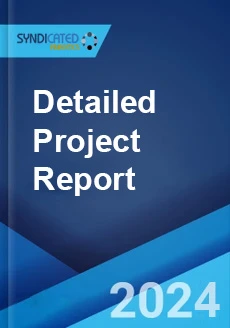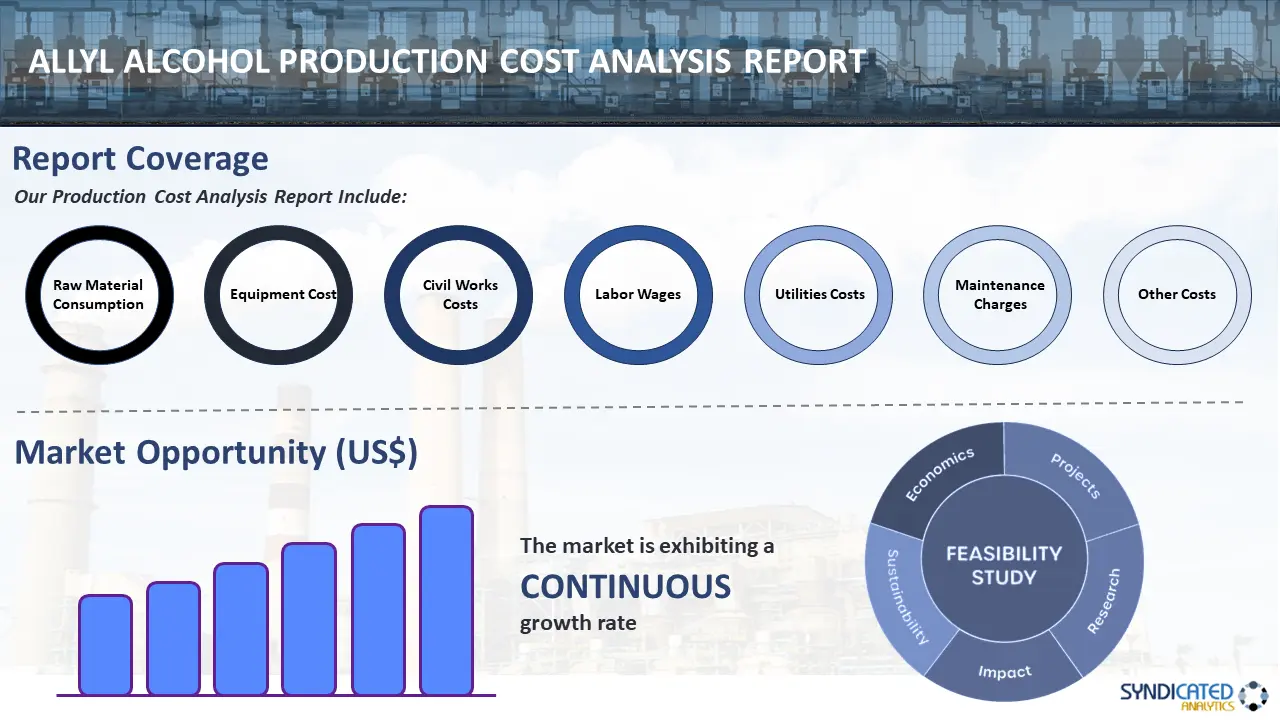
Allyl Alcohol Production Cost Analysis Report 2025 Edition: Industry Trends, Capital Investment, Price Trends, Manufacturing Process, Raw Materials Requirement, Operating Cost, and Revenue Statistics
Report Overview:
The report by Syndicated Analytics, titled “Allyl Alcohol Production Cost Analysis Report 2025 Edition: Industry Trends, Capital Investment, Price Trends, Manufacturing Process, Raw Materials Requirement, Operating Cost, and Revenue Statistics ,” offers a comprehensive examination of the operating costs and revenue statistics associated with establishing an allyl alcohol plant. It is the culmination of extensive primary and secondary research, encompassing a detailed analysis of market trends and the impact of COVID-19 on both global and regional levels. Additionally, it provides profiles of key industry players. The report also delves into price trends, mass balance required raw materials, and the various unit operations integral to the allyl alcohol manufacturing process. It includes a comprehensive capital cost analysis while covering the cost breakdown of raw materials, utilities, labor, packaging, transportation, land and construction, and machinery. The study also presents projected profit margins and recommends optimal product pricing strategies. For individuals contemplating entry into the allyl alcohol industry or those with vested interests, this report is an essential resource.

Allyl alcohol (C3H6O) is a clear, colorless, and flammable organic compound with a mustard-like odor. It is commercially produced by the catalyzed acetoxylation of propylene, hydrogenation of propylene-derived acrolein, and propylene oxide isomerization. Allyl alcohol is widely used to produce chemicals, flame-retardant materials, drying oils, plasticizers, resins, and pharmaceuticals. It is also used as a herbicide, pesticide, insecticide, anti-bacterial agent, and plant metabolite. Allyl alcohol is a highly reactive and water-soluble chemical that offers long-shelf life and ultraviolet (UV) stability and can easily undergo several chemical reactions, such as esterification and polymerization. As a result, it finds extensive applications across the chemical, polymer, pharmaceutical, and plastic industries.
The rising product utilization in the chemical industry is one of the primary factors driving the market growth. Allyl alcohol is widely used as a raw material to produce glycerol, diallyl phthalate, diallyl isophthalate, allyl diglycol carbonate, allyl glycidyl ether, 1,4-butanediol, acrolein, and poly (styrene-allyl alcohol). Furthermore, the widespread product utilization in the polymer industry to engineer thermoplastic polymers that are used in eyeglass lenses, optical plastics, inks, toners, coatings, overprint varnishes, and maintenance paints is providing an impetus to the market growth. In addition to this, allyl alcohol is widely employed to manufacture thermosetting resins for high-voltage electrical parts, decorative laminates, and electronic components due to their superior chemical and corrosion resistance, electrical properties, and dimensional stability, which is acting as another growth-inducing factor. Additionally, the recent development of a sustainable production method using an aluminosilicate zeolite catalyst, which performs a direct gas-phase conversion of glycerol to allyl alcohol, further eliminating the need for extensive and toxic feedstocks, multistep synthesis, and environmentally unfriendly route, is positively influencing the market growth. Moreover, increasing product utilization to produce allyl phenylacetate, an ester used in the perfume and flavoring industries due to its fruity-honey odor, is favoring the market growth. Other factors, including rising product demand as a pharmaceutical intermediate, increasing adoption in the food industry, and rapid development of novel production methods, are anticipated to drive the market growth.
This production cost analysis report by Syndicated Analytics is the result of a comprehensive examination of the allyl alcohol manufacturing process. The study covers all the requisite aspects that one needs to know while making a foray into the allyl alcohol industry. It is based on the latest economic data and presents exhaustive insights about the primary process flow, raw material requirements, reactions involved, utility costs, operating costs, capital investments, pricing, margins, etc. This report is a must-read for entrepreneurs, investors, researchers, consultants, business strategists, and all those who have any kind of stake in the allyl alcohol industry.
The following technical and economic aspects are included in the report:
- Market Trends
- Impact of COVID-19
- Major Regions
- Key Manufacturers
- Price Trends
- Mass Balance and Raw Material Requirements
- Various Types of Unit Operations Involved
- Raw Material Costs
- Utility Costs
- Labor Costs
- Packaging Costs
- Transportation Costs
- Land and Construction Costs
- Machinery Costs
- Profit Margins
- Product Pricing
Key Questions Answered in This Report?
- What are the various unit operations involved in manufacturing allyl alcohol?
- What are the raw material requirements and costs in manufacturing allyl alcohol?
- What are the utility requirements and costs in manufacturing allyl alcohol?
- What are the manpower requirements and costs in manufacturing allyl alcohol?
- What are the packaging requirements and costs in manufacturing allyl alcohol?
- What are the transportation requirements and costs in manufacturing allyl alcohol?
- What are the land requirements and costs in manufacturing allyl alcohol?
- What are the construction requirements and costs in manufacturing allyl alcohol?
- What are the profit margins in allyl alcohol?
- What should be the pricing mechanism of allyl alcohol?
Need a Customized Project Report?
Although we have tried to make the report as comprehensive as possible, we believe that every stakeholder may have their specific requirements. In view of this, we can customize the report based on your particular needs. You can share your business requirements with our consultants, and we will provide you a tailored scope. Some of the common customizations that our clients request us include:
- The report can be customized based on the country/region that you plan to set up your plant.
- The manufacturing capacity of the plant can be customized based on your requirements.
- Machinery suppliers and costs can be customized based on your requirements.
- Any additions to the current scope can also be provided based on your requirements.
Why buy Syndicated Analytics reports?
- Our reports provide stakeholders insights into the viability of a business venture, allowing them to make informed business decisions.
- We have a strong network of consultants and domain experts in 100+ countries across North America, Europe, Asia Pacific, South America, Africa, and the Middle East.
- We have a strong database of equipment and raw material suppliers across all major continents.
- We regularly track and update land costs, construction costs, utility costs, labor costs, etc. across 100+ countries around the globe.
- We are the trusted business partners of the world’s leading corporates, governments, and institutions. Our client list ranges from small and start-up businesses to Fortune 500 companies.
- Our strong in-house team of engineers, statisticians, modeling experts, charted accountants, architects, etc. have been instrumental in building, expanding, and optimizing sustainable manufacturing plants across the globe.
Purchase Options
Ask For Customization
Personalize this research
Triangulate with your own data
Get data as per your format and definition
Gain a deeper dive on a specific application, geography, customer or competitor
Any level of personalization
Get in Touch
Call us on
US: +1-213-316-7435
Uk: +44-20-8040-3201
Drop us an email at
sales@syndicatedanalytics.com